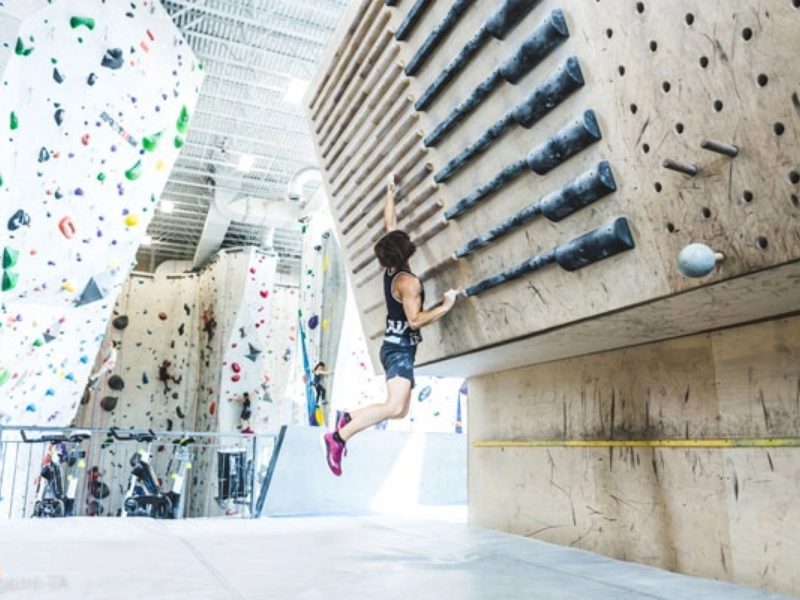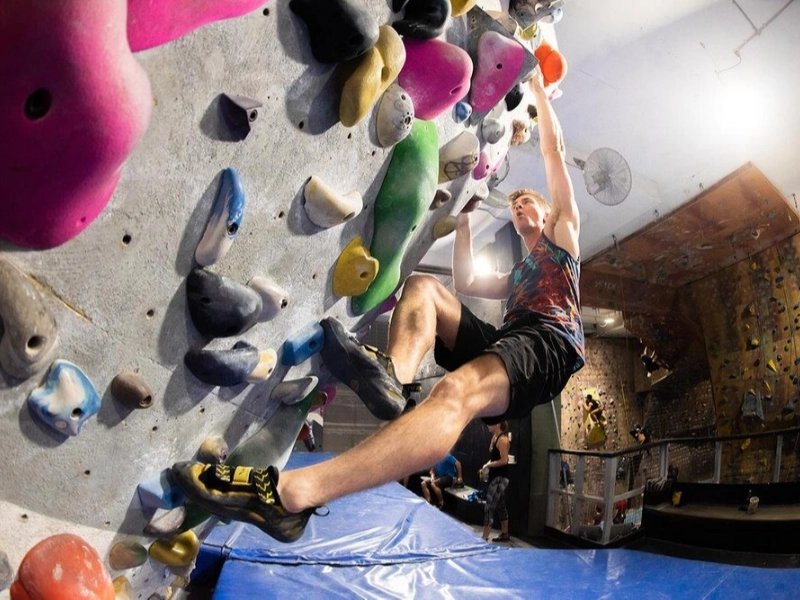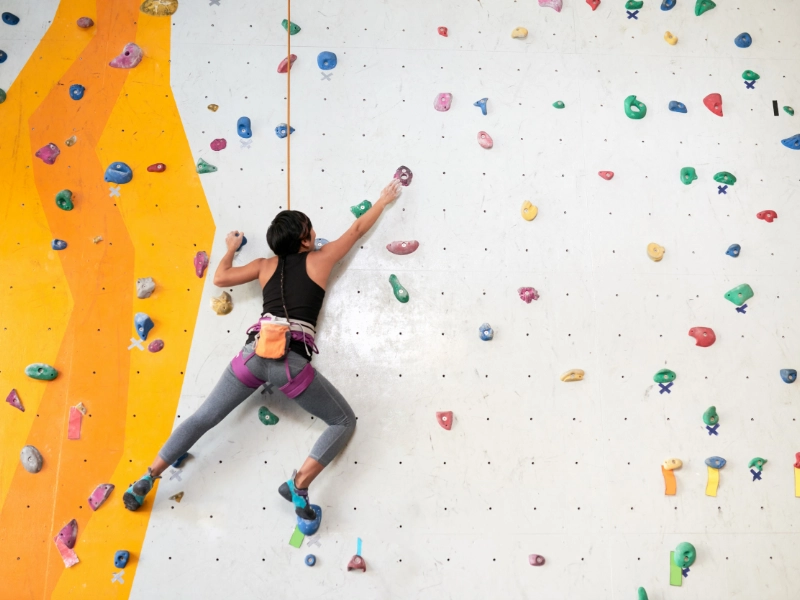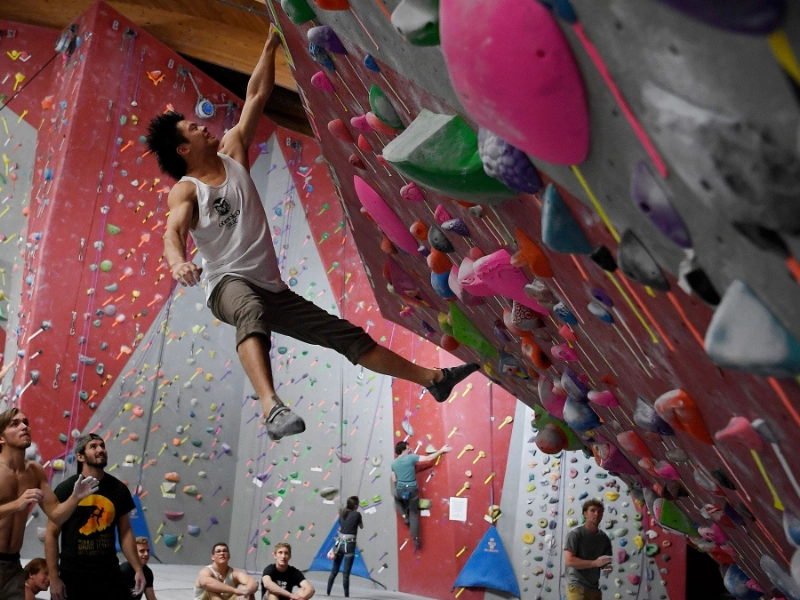If you can't climb with confidence, all the finger strength and pulling power in the world won't be enough to push you up routes beyond your limit. Fortunately, you can practice and develop climbing confidence, just like power endurance or one-arm pull-ups. Try "flagging" with your feet, which means you should make poor foot choices in order to make yourself trust your legs. Starting a treadmill wall in your home gym is a great idea.

 It's crucial to resist allowing negative thoughts to drag you down. These self-defeating ideas have the power to undermine your motivation and self-assurance. They may also cause tenseness in your body and interfere with breathing.
As much as a physical struggle, climbing can also be a psychological one. A climber's success depends on having an optimistic outlook.
Consider your advantages over comparing yourself to other climbers. To boost your confidence, remind yourself of your strong points—whether it's your excellent core strength, your excellent work ethic, or your high climbing IQ. Making earlier victories visible is another useful tactic. Recalling that you have successfully navigated difficult circumstances in the past, such as flashing a route with a challenging loudness sequence, can be helpful.
It's crucial to resist allowing negative thoughts to drag you down. These self-defeating ideas have the power to undermine your motivation and self-assurance. They may also cause tenseness in your body and interfere with breathing.
As much as a physical struggle, climbing can also be a psychological one. A climber's success depends on having an optimistic outlook.
Consider your advantages over comparing yourself to other climbers. To boost your confidence, remind yourself of your strong points—whether it's your excellent core strength, your excellent work ethic, or your high climbing IQ. Making earlier victories visible is another useful tactic. Recalling that you have successfully navigated difficult circumstances in the past, such as flashing a route with a challenging loudness sequence, can be helpful.
 Climbing is a dangerous sport that puts you at risk for both bodily harm and the psychological fallout from failing. Resilience building in climbing is about learning how to deal with failures so that you may push past your fear and climb higher on the rock.
To hone this talent, try concentrating on your advantages and keeping them separate from your performance on the rock. This will enable you to reach your top performance level and climb with confidence and freedom.
Consider working with a coach to gain a clearer understanding of your blind spots if you're not sure what your personal strengths are. A competent coach will evaluate your overall climbing and fitness level and pinpoint the areas that need the most work. They will then provide you with specialized instruction to help you achieve your goal.
Climbing is a dangerous sport that puts you at risk for both bodily harm and the psychological fallout from failing. Resilience building in climbing is about learning how to deal with failures so that you may push past your fear and climb higher on the rock.
To hone this talent, try concentrating on your advantages and keeping them separate from your performance on the rock. This will enable you to reach your top performance level and climb with confidence and freedom.
Consider working with a coach to gain a clearer understanding of your blind spots if you're not sure what your personal strengths are. A competent coach will evaluate your overall climbing and fitness level and pinpoint the areas that need the most work. They will then provide you with specialized instruction to help you achieve your goal.
 In addition to being essential to climbing performance, developing a resilient attitude can assist you in overcoming fear and self-defeating behaviour in other spheres of your life. This requires regular practice, reflection, and the courage to confront your limiting ideas and take decisive action.
Though they may not always be reasonable or logical, the critical voices in your head have the power to shape reality if you allow them to. To build your confidence, practice recognizing the voice, creating some space between you and it, and encouraging self-talk.
Strive to remain in the 4–7 zone, which is the area where you are pushing yourself past your comfort zone and expanding your limitations without going so far as to get frightened or hurt. Over time, this should diminish your fear of vulnerability.
In addition to being essential to climbing performance, developing a resilient attitude can assist you in overcoming fear and self-defeating behaviour in other spheres of your life. This requires regular practice, reflection, and the courage to confront your limiting ideas and take decisive action.
Though they may not always be reasonable or logical, the critical voices in your head have the power to shape reality if you allow them to. To build your confidence, practice recognizing the voice, creating some space between you and it, and encouraging self-talk.
Strive to remain in the 4–7 zone, which is the area where you are pushing yourself past your comfort zone and expanding your limitations without going so far as to get frightened or hurt. Over time, this should diminish your fear of vulnerability.
 By concentrating on your strengths—tactical, mental, and physical—you can develop confidence quickly. This can help you get past uncertainties caused by irrational worries, internalised criticism, or unhelpful climbing companions.
Another excellent way to increase your confidence is to remind yourself of your past achievements. When you are feeling anxious or dubious, remembering a time when you overcame a difficult climb will help you realize that you are capable of conquering any obstacle.
Visualizing is one of the best ways to decompress and reduce your stress levels before and during your climb. Imagine yourself in a peaceful setting, capturing all the specifics such as the ambient temperature, scents, and emotions. This can help you stay focused during your ascent by providing a quick and simple image.
By concentrating on your strengths—tactical, mental, and physical—you can develop confidence quickly. This can help you get past uncertainties caused by irrational worries, internalised criticism, or unhelpful climbing companions.
Another excellent way to increase your confidence is to remind yourself of your past achievements. When you are feeling anxious or dubious, remembering a time when you overcame a difficult climb will help you realize that you are capable of conquering any obstacle.
Visualizing is one of the best ways to decompress and reduce your stress levels before and during your climb. Imagine yourself in a peaceful setting, capturing all the specifics such as the ambient temperature, scents, and emotions. This can help you stay focused during your ascent by providing a quick and simple image.